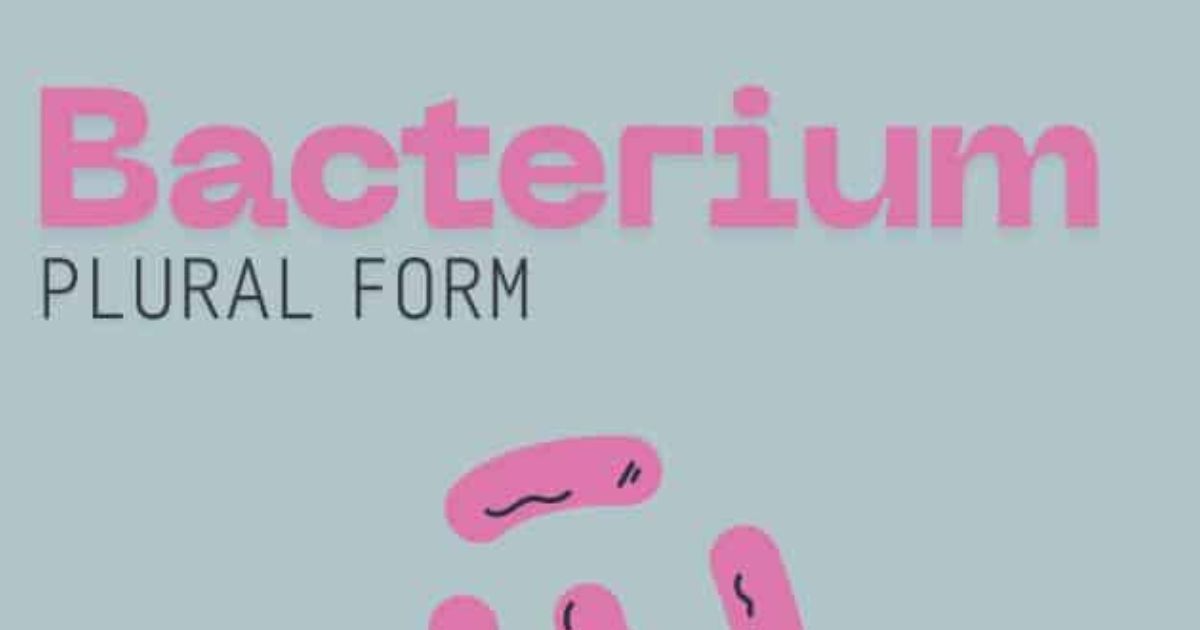The correct plural form of scientific terms is essential for clear communication, especially in biology and medicine. The word “bacterium” often causes confusion because it follows Latin grammatical rules rather than standard English pluralization patterns. Many people incorrectly say “bacteriums” or use “bacteria” and “bacterium” interchangeably without realizing the distinction.
The bacterium plural form is “bacteria,” derived from Latin where words ending in “-um” typically form their plurals by changing to “-a.” This linguistic pattern applies to many scientific terms borrowed from Latin. Knowing when to use “bacterium” (singular) versus “bacteria” (plural) is crucial for students, healthcare professionals, scientists, and anyone discussing microbiology.
Is The Bacterium Plural Form?
No, “bacterium” is not the plural form it is actually the singular form. The word comes from Latin, where “bacterium” refers to a single microscopic organism. When scientists discovered these tiny life forms in the 19th century, they adopted Latin naming conventions that were standard in biological classification. The plural form is “bacteria,” which refers to multiple bacterial organisms.

This Latin derived pattern follows the same rule as other scientific terms like “datum” (singular) and “data” (plural), or “medium” and “media.” You are talking about one microorganism, you say “bacterium,” but when referring to two or more, you use “bacteria.”
Bacterium Meaning
A bacterium is a single celled microorganism that belongs to the domain Bacteria, one of the three primary domains of life. These microscopic organisms are among the oldest and most abundant life forms on Earth, existing in virtually every environment imaginable.
Bacteria Meaning
Bacteria is the plural form of bacterium, referring to multiple microscopic, single-celled organisms that lack a cell nucleus. These tiny life forms are found everywhere on Earth, from the deepest ocean trenches to the human body, where trillions of bacterial cells live on our skin and in our digestive system.
Uses Of Bacterium In Sentences
- The scientist isolated a single bacterium from the contaminated water sample to study its properties.
- Each bacterium in the petri dish divided rapidly, doubling the population every twenty minutes.
- The doctor explained that only one bacterium was needed to start the infection in the patient’s bloodstream.
- Under the microscope, we could observe how the bacterium moved using its whip-like flagellum.
- This particular bacterium has developed resistance to multiple antibiotics, making it difficult to treat.
- The bacterium E. coli is commonly found in the human digestive system and usually causes no harm.
- Researchers discovered that the bacterium could survive in extreme temperatures that would kill most other organisms.
- When a bacterium enters a host cell, it can sometimes hijack the cell’s machinery for its own reproduction.
- The beneficial bacterium in yogurt helps maintain a healthy balance of microorganisms in the gut.
- Scientists identified the bacterium responsible for the outbreak by analyzing its genetic sequence.
Uses Of Bacteria In Sentences
- Bacteria are essential for breaking down organic matter in soil and returning nutrients to the ecosystem.
- The doctor prescribed antibiotics to kill the harmful bacteria causing the throat infection.
- Beneficial bacteria in our intestines help digest food and produce important vitamins.
- Scientists discovered that some bacteria can survive in boiling hot springs and frozen Antarctic ice.
- The food was left out too long, allowing bacteria to multiply and spoil it.
- Bacteria play a crucial role in making cheese, yogurt, and other fermented foods.
- Hand washing with soap helps remove bacteria from your skin and prevents the spread of disease.
- Certain bacteria have evolved to become resistant to multiple antibiotics, creating a public health concern.
- The bacteria in the petri dish formed visible colonies after incubating overnight.
- Nitrogen-fixing bacteria in plant roots convert atmospheric nitrogen into a form plants can use.
- Scientists are studying bacteria that can digest plastic and help clean up environmental pollution.
- The human body contains trillions of bacteria, most of which are harmless or beneficial.
Read More: Uri Poliavich: Insights into His Business Leadership and Strategy
Conclusion
The bacterium plural form is “bacteria,” a distinction rooted in Latin grammar that remains important in scientific and medical communication today. That “bacterium” refers to a single microscopic organism while “bacteria” refers to multiple organisms helps ensure accuracy when discussing these vital life forms.
These microorganisms play countless roles in our world from aiding digestion and producing food to causing disease and cycling nutrients through ecosystems. You are a student learning about microbiology, a professional in the healthcare field, or simply someone interested in science, using the correct singular and plural forms demonstrates precision and professionalism.
FAQs
What Is The Plural Of Bacterium?
The plural of bacterium is “bacteria.” This follows the Latin pluralization rule where words ending in “-um” change to “-a” in their plural form.
Is It Correct To Say Bacteriums?
No, “bacteriums” is grammatically incorrect. The proper plural form is “bacteria,” not “bacteriums,” because bacterium is a Latin-derived word that follows Latin grammar rules.
Can I Use Bacteria To Refer To Just One Organism?
No, “bacteria” is plural and refers to multiple organisms. If you’re discussing a single organism, you should use “bacterium.” For example: “One bacterium can divide into millions of bacteria.”



